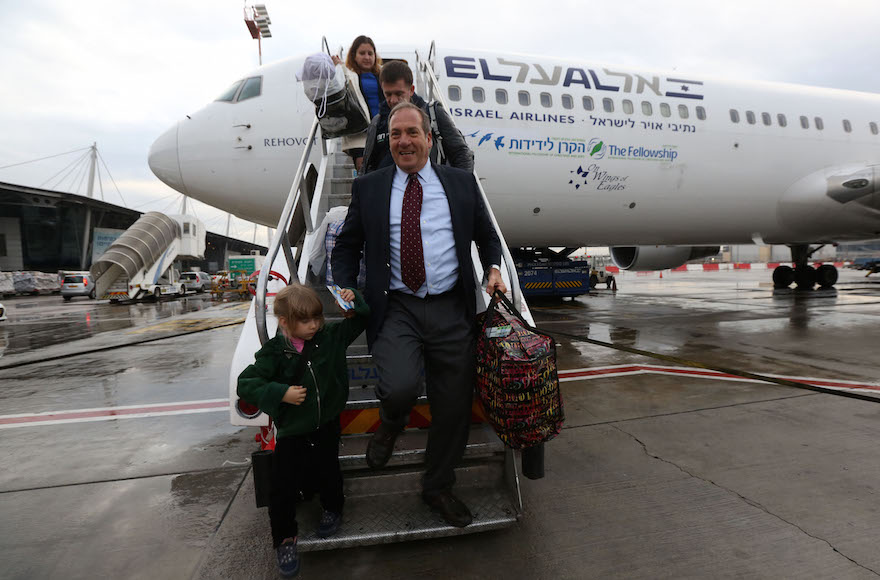Christian-funded philanthropy claims 1/5 of Jewish immigration this year, irking main aliyah body
Published December 5, 2016

Rabbi Eckstein exiting the first flight organized by the the International Fellowship of Christians and Jews, Dec 2014. (Courtesy of IFCJ)
JERUSALEM (JTA) — A Christian-funded philanthropy announced it will have helped 4,300 Jews resettle in Israel this year, claiming a much larger share of immigration than ever before and drawing the ire of the main aliyah body.
ADVERTISEMENT
The International Fellowship of Christians and Jews revealed to JTA for publication Monday that it was on track to bring 4,300 Jews to Israel in 2016, accounting for 18 percent of the total aliyah from overseas. The fellowship heralded its increased role in aliyah as “a powerful shift in Jewish immigration to Israel.”
“Thanks to our millions of Christian supporters in the U.S. and around the world, we are bringing more and more Jewish people home to Israel,” Eckstein said in a statement. “In just three years, we have become the major aliyah force in many countries, and we are determined to continue rescuing Jews around the world in the months and years ahead.”
Founded by Rabbi Yechiel Eckstein, the fellowship is a nonprofit group that raises $180 million a year in donations for programs to benefit Israel and the Jewish people, mostly from Christians. In addition to aliyah, the group arranges trips and activities for immigrants inside Israel, job market guidance, childcare solutions and, for needy immigrants, rent and dental care.
Eckstein was a major donor to the Jewish Agency, Israel’s official aliyah provider, until 2014 when he cut ties to start his own group, creating lasting bad blood. He also helped found Nefesh B’Nefesh, another major aliyah group, but broke off relations in the early 2000s. The fellowship offers grants — $1,000 or six months’ rent for adults — beyond what immigrants receive from Israel when they immigrate through the Jewish Agency.
ADVERTISEMENT
Asked to respond to the fellowship’s statement, the Jewish Agency suggested Eckstein’s group takes credit for and “undermines” the agency’s work and depresses overall aliyah, which the government has empowered it alone to handle, with some help from Nativ in the former Soviet Union.
“No amount of sophistry or creative accounting can change one basic fact: the only organization empowered by the State of Israel to facilitate Aliyah from around the world is The Jewish Agency,” the agency said in a statement to JTA that did not directly name the fellowship. “Whether the individual [immigrant] ultimately utilizes the plane ticket purchased for him or her by The Jewish Agency or opts to board another specially-branded plane at the last moment in exchange for financial inducements, the fact remains that it is The Jewish Agency that has made their Aliyah possible.”
The statement also said: “In fact, virtually none of the countries in which the organization boasts activity have seen increases in Aliyah – the vast majority have seen Aliyah remain static or drop … It’s almost as though they have a reverse Midas touch, causing Aliyah to shrink wherever they go … As has been proven time and again, Aliyah is not an area in which competition is helpful or productive.”
Eckstein has said in the past he aims to end the Jewish Agency’s “monopoly” on aliyah and increase Jewish immigration to Israel. Including those already living in Israel, more than 31,000 people are expected to make aliyah in 2016, a 13-year high.
The fellowship’s statement, which focused largely on its growing share of the aliyah market, claimed responsibility for more than 40 percent of the 7,600 immigrants that moved to Israel between January and September from the 19 countries where it operates. The group said it was the “dominant force for Jewish immigration to Israel from nine countries in 2016”: Belarus, Latvia, Lithuania, Moldova, Spain, Turkey, Ukraine, Uruguay and Venezuela.
According to the fellowship, Ukraine is its “most precarious mission.” Many of the Ukrainian Jews who will make aliyah with the Fellowship this year were displaced from their homes, especially in eastern Ukraine, by clashes between pro-Russian rebels and Ukrainian troops, the group said. The fellowship said it “housed and cared for” 2,800 Ukrainian Jews in the past two years, most of whom it will bring to Israel.
The fellowship said it was responsible for 77 percent of aliyah from Ukraine in 2016.















